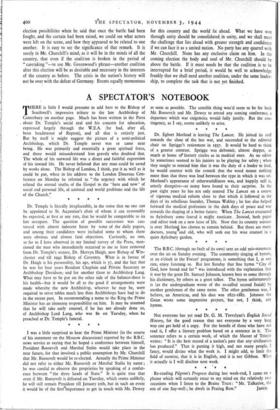Dr. Egbert Morland is leaving The Lancet. He joined its
staff towards the close of the last war, and succeeded to the editorial chair on Sprigge's retirement in 1937. It would be hard to think of a greater contrast. Sprigge was debonair, almost dapper, as much at home irf literary circles as in medical ones. As an editor he sometimes seemed to his juniors to be playing for safety ; when they sought to remind him that it was the duty of a leader to lead, he would counter with the remark that the word meant nothing more than that there was lead between the type in which it was set. Morland's appearance of otherworldliness was, and happily still is, utterly deceptive—as many have found to their surprise. In the past eight years he has not only steered The Lancet on a course of vigorous medical reform close to that which it followed in the days of its rebellious founder, Thomas Wakley ; he has also helped forward the medical profession in the dark days of peace and war towards the shaping of a better future. When The Lancet evacuated to Aylesbury some feared it might rusticate. _Instead, both paper and editor took on a new lease of life. Now that its country sojourn is over Morlani has chosen to remain behind. But there are many doctors, young and old, who will seek out his wise counsel in a quiet Aylesbury garden.
* * * *


























 Previous page
Previous page